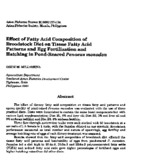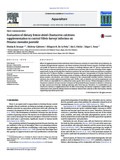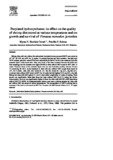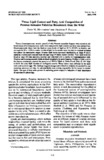Effect of fatty acid composition of broodstock diet on tissue fatty acid patterns and egg fertilization and hatching in pond-reared Penaeus monodon
Share
Abstract
The effect of dietary fatty acid composition on tissue fatty acid patterns and Penaeus monodon was evaluated with the use of 3 practical diets. Diets were formulated to contain the same basal components but with various lipid supplementation: Diet B1, 6% cod liver oil; Diet B2, 3% cod liver oil and 3% soybean lecithin; and Diet B3, 6% soybean lecithin.
Three flow-through maturation tanks were each stocked with 50 broodstock at a sex ratio of 1.5 female to 1 male, with the females ablated on one eyestalk. Broodstock performance measured as total number and nature of spawnings, egg fertility and average hatching rate of eggs of each dietary treatment was assessed.
Results showed that the fatty acid composition of broodstock diet affected the tissue fatty acid patterns and hatchability of eggs from pond-reared P. monodon . Females fed a diet high in 20:4n-6, 20:5n-3 and 22:6n-3 polyunsaturated fatty acids and n-3/n-6 fatty acid ratio gave higher percentages of fertilized eggs and higher hatching rates than did other diets.
Suggested Citation
Millamena, O. M. (1989). Effect of fatty acid composition of broodstock diet on tissue fatty acid patterns and egg fertilization and hatching in pond-reared Penaeus monodon. Asian Fisheries Science , 2(2), 127-134. http://hdl.handle.net/10862/1301
Subject
Taxonomic term
Collections
- AQD Journal Articles [1249]
Related items
Showing items related by title, author, creator and subject.
-
Evaluation of dietary freeze-dried Chaetoceros calcitrans supplementation to control Vibrio harveyi infection on Penaeus monodon juvenile
Seraspe, Ebonia B.; Gabotero, Shirleny; de la Peña, Milagros R.; Pahila, Ida G.; Amar, Edgar (Elsevier, 2014)Effects of supplementation of diets with freeze-dried Chaetoceros calcitrans to control Vibrio harveyi infection are evaluated through immune responses, and disease resistance of juvenile Penaeus monodon. Total lipid and ... -
Butylated hydroxytoluene: its effect on the quality of shrimp diet stored at various temperatures and on growth and survival of Penaeus monodon juveniles
Bautista-Teruel, Myrna N.; Subosa, Precilla F. (Elsevier, 1999)Shrimp diets with and without the antioxidant, butylated hydroxytoluene (BHT) were stored at 10°, 20°, 28°–30°, and 40°C for 10 weeks. To monitor lipolysis and lipid oxidation, free fatty acid (FFA) content, peroxide values ... -
Tissue lipid content and fatty acid composition of Penaeus monodon Fabricius broodstock from the wild
Millamena, Oseni M.; Pascual, Felicitas P. (Wiley-Blackwell, 1990)Tissues (hepatopancreas, muscle, gonad) of wild Penacus mordon females with ovaries in different stages of development and males were analyzed for Upid content and fatty acid composition. Hepatopancreatic tissue had the ...






